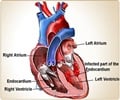Weight loss has long been known to improve symptoms of heart failure. Now, zero gravity confirms that reducing external pressure can also help!

‘Zero gravity expands heart chambers and reduces pressure—could this be the future of treating obesity-related heart failure? #obesity #hearthealth #medindia’





A study published in the journal JAMA Network(1✔ ✔Trusted SourceHeart Failure in Zero Gravity - External Constraint and Cardiac Hemodynamics
Go to source) explains how zero gravity affects heart functioning in patients with heart failure with preserved ejection fraction and obesity.
Role of Gravity in Heart Failure
Two patients with HFpEF, obesity and implanted CardioMems sensors were studied during parabolic flight, a special flight that simulates different gravitational conditions including zero gravity, normal gravity and increased gravity.During zero gravity or weightlessness, the pressure in arteries near the patient's lungs dropped by 8 mm Hg for one patient and 9 mm Hg for another patient. On the other, when gravity was increased to 1.8G, the pressure increased suggesting that reduced external pressures can relieve the strain on the heart.
Weightlessness in 0G condition results in reduced pulmonary artery diastolic pressure (PADP) indicating that external constraints (chest wall and lung weight, fats) play an important role in increasing the pressure seen in obesity related heart failure.
Zero gravity conditions temporarily reduce the pressure which aligns with clinical evidence that weight loss improves symptoms in patients with heart failure with preserved ejection fraction.
Advertisement
Why Heart Pressure Decreased in Zero Gravity
The heart chamber must be stiff to pump blood effectively under normal gravity. In zero gravity, the heart can stretch and fill with more blood due to less pressure. Heart becomes more flexible under zero gravity.The heart chamber gets bigger due to less force exerted on it. This expansion helps the heart hold more blood without increasing the pressure.
Understanding how zero gravity affects heart pressure helps scientists learn more about heart conditions on Earth. It shows that weight loss and reducing the pressure on the heart provides better health outcomes.
Reference:
- Heart Failure in Zero Gravity—External Constraint and Cardiac Hemodynamics - (https:jamanetwork.com/journals/jamacardiology/fullarticle/2826351)
Source-Medindia















